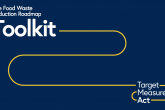Tesco cuts 200,000 tonnes of food waste from operations
Tesco has worked in partnership with its suppliers to cut 200,000 tonnes of food waste from their combined operations.
This comes as Tesco published its own food waste data for the eighth year yesterday (23 September) and encourages other retailers and food companies to do the same. Food waste reporting for UK retailers is currently voluntary, but Tesco has previously called upon the government to make it mandatory.
 Tesco has been leading the way in food waste prevention for several years now, ranking as the top supermarket for reducing food waste levels in 2018.
Tesco has been leading the way in food waste prevention for several years now, ranking as the top supermarket for reducing food waste levels in 2018.
Tesco has reached this important food waste reduction milestone by working closely with 71 of its largest suppliers around the world, all of whom are also making their food waste data public today.
24 of Tesco’s largest food suppliers from countries such as Poland, Slovakia and the Czech Republic agreed to start publishing food waste data following Tesco’s encouragement to adopt the United Nations’ Sustainable Development Goal (SDG) to halve food waste by 2030.
Tesco helped its own-label suppliers to cut 125,000 tonnes of food waste over three years and worked in partnership with 11 of the world’s biggest household brands – including Coca-Cola, Kellogg’s, Nestlé and Unilever – as they cut a further 30,000 tonnes from their operations.
The supermarket will also announce that it has cut 45,000 tonnes from its global operations since it began reporting and has now exceeded the goal of halving food waste by 2030 in its Central European operation by cutting 58 per cent of its food waste intensity.
The combined effects of climate change and Covid-19 have made tackling food waste more urgent than ever, according to Tesco and members of global coalition Champions 12.3.
The coalition will warn that food waste accounts for eight per cent of all global greenhouse gas emissions and that unless humanity acts now, the world’s capacity to tackle the climate emergency will be fatally undermined.
Food waste reduction in the UK, while progressing, is uneven between sectors. The Waste and Resources Action Programme (WRAP) revealed in January that food manufacturers have lowered their sector waste by around 10 per cent while retail food waste rose slightly to 277,000 tonnes compared to 260,000 in 2015.
WRAP has also been trying to tackle food waste with its Food Waste Reduction Roadmap that helped 45 members that publicly reported their waste levels save 180,000 tonnes of food in 2019.
Meanwhile, Covid-19 has exposed weaknesses in the global food system, driving up food waste, impacting farmer incomes and increasing the number of people suffering from hunger.
Tesco has been working to improve redistribution of surplus food through working with behaviour change charity Hubbub to launch a food waste challenge that aims to tackle the 6.6 million tonnes of food waste generated by UK households each year.
It also recently announced that it will be working with food sharing app OLIO to provide free excess food to local communities.
Tesco CEO, and Chair of Champions 12.3, Dave Lewis said: “One third of the world’s food is going to waste, while one in nine people go hungry. If food loss and waste were a country, it would be the third largest emitter of greenhouse gases on the planet. In order to halve global food waste by 2030, more must be done with more urgency than ever before.
“Significant progress is being made. The UK has cut its food waste by 27 per cent since 2007 and hundreds of companies, including many of our own suppliers, are doing their part too. But there is still more to do. We need even more companies to set food waste reduction targets and publish their data.
“We are also asking the UK Government, and its counterparts around the world, to embed food loss and waste reduction into post-Covid plans to bolster supply chains, as well as strategies to meet commitments to the Paris Agreement on Climate Change.”









